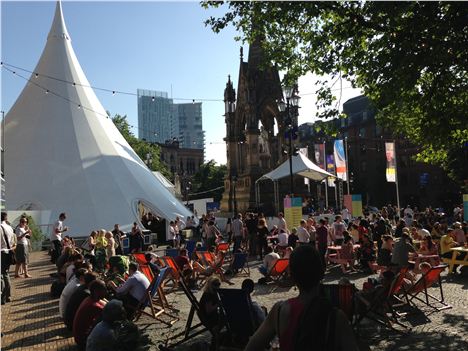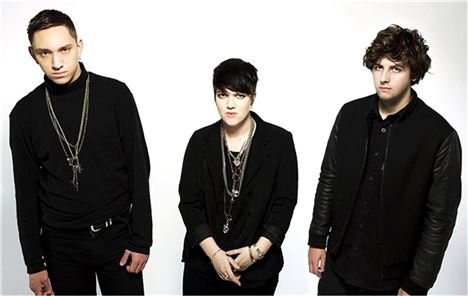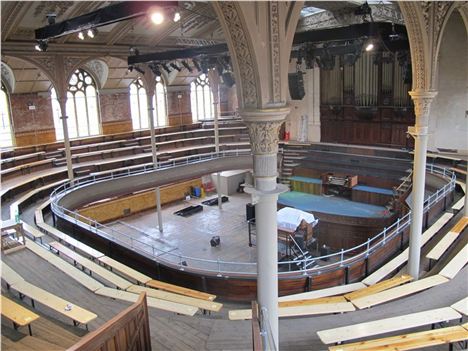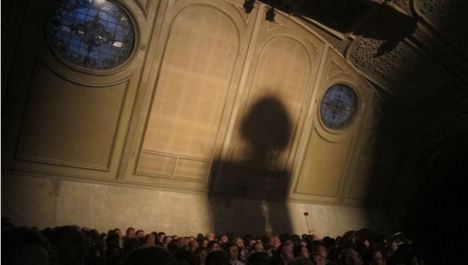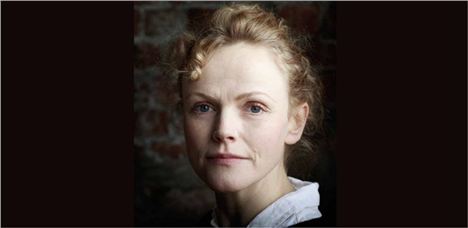IT’S been three weeks now since she left but I’m still in love.
Being given the freedom to let artists take the safety net off is so rewarding. Watching something start and then develop is astonishing when it works.
Manchester International Festival 2013 (MIF) has faded into past tense, an all too brief affair, but one the city should long remember.
Now we're getting the anatomy of the passion. MIF is gathering the stats for the biennial event. These include a headline figure of 250,000 visitors and a daft figure of 60,000 pints pulled in Festival Square. There’ve been a few post-MIF interviews as well including one with Confidential.
Alex Poots, the Festival Director, is understandably cock-a-hoop when we talk. The shows in MIF 2013 were largely heaped with praise. And the sun shone throughout.
Blue sky creative thinking
“Yes, we were blessed by the weather,” says Poots, “but we were also blessed with all the new or ‘found spaces’ we used. These made this festival feel a bit different. I felt the success of Festival Square and how the performances elsewhere seemed to match the venues, made the festival seem embedded in the city.”
He’s right. That was the key. The programme seemed pared down this year, simpler, more direct, more honest perhaps. The 'celebrity' nature of previous performers in earlier festivals now seems somehow distracting, as though the famous names overshadowed the purity of the idea behind MIF - a festival devoted to pioneering new work or fresh interpretations. The festival might have had Branagh and Massive Attack but felt better for not having a truculent Lou Reed or a passing-through Kanye West.
“I think there was a better balance this time,” says Poots. “There was more theatre for one thing which was the way it just turned out. That worked very well for us. Sometimes you have to have luck like that in the way a festival defines itself.”
That surprises me. “Are you saying the programming for MIF isn’t carved in stone from the moment of commissioning?”
“Exactly. The festival is all about finding the right artist and then asking them to let their hair down and produce a work. That freedom lies at the core of the festival. So, for example, last time around we’d commissioned Victoria Wood to write a play but in the end she found it was best expressed as a musical. So the emphasis in 2011 seemed more on music. Things happen like that. It’s an artist led festival. This time the theatre balanced out the music."
Poots pauses for a moment, gathering his thoughts, changing direction.
“What Ken (Kenneth Branagh) achieved with Macbeth to get that many shining reviews from across the cultural world was remarkable. He’s had about fifty people offering to present the show elsewhere. We got four or five Broadway producers coming over to watch. They were asking how did you get this and then asking how they could get their hands on it? I told them it was all part of finding the perfect space in St Peter’s Church in Ancoats. Ken was immediately taken with the church, immediately started imagining how the space might work.”
Branagh as Macbeth
Poots speaks quietly, with a Scottish lilt that without over-emphasis manages to convey the passion he feels for his job. Forty-six now and a small dark-haired, greying, man, he was born in Edinburgh to an Irish father and French mother. He got into the arts early studying music at City University, London.
After spells trying to make it as a musician he realised his forte was dreaming dreams for performers rather than being one himself. He arrived in Manchester to realise the first MIF in 2007 after spells in Edinburgh, the Barbican, Tate Modern and English National Opera.
“Aside from Macbeth, what other personal highlights from 2013 did you have?” I ask.
“Beer,” laughs Poots. “In Festival Square it was great to see us getting the beer right. This is down to you lot at Manchester Confidential getting so annoyed at us over the last few festivals by our lack of regional ales.”
Dear readers we’ll always try to fight the good fight for you. And it’s true we have written a couple of times about this sin of omission at previous festivals so the addition of localish (Blackburn) beers from Thwaites was welcome.
“More seriously,” continues Poots, “I thought Maxine Peake and the xx were perfect. They were simple, beautiful and powerful ideas. The xx show, where the audience became lost and disoriented to finally emerge into a space where the band was waiting for them, was special.
"Meanwhile Maxine Peake performing so close to where the events of Peterloo happened, and then delivering the lines by Shelley with such timing, craft and passion was very moving. Maxine really cares about the city and the subject and that showed.”
The xx, got an excess of praise
Poots then reveals a political edge to his character. Left leaning of course, he is arty.
“I liked how Macbeth and Masque of Anarchy were reflective of the times we live in. Macbeth examined how power corrupts, corrupts even the soul, Maxine Peake’s Masque of Anarchy spoke of the powerlessness of the majority.”
Again Poots pauses in his thought process, as though he’s forgotten about something.
“But there were other special moments too,” he says, perhaps feeling suddenly guilty about the other shows.
He starts a list including Abda Parveen, John Taverner, Martha Argervich, MONEY, The Machine, Mogwai until I stop him and point out that he’s cheating. Highlights are highlights, the exceptions not the rule.
After all there were failures such as Adam Curtiss v Massive Attack at Mayfield Station. We disagree over the latter, Poots admiring the “scale of the show, the ambition and the way it worked with the music”, me thinking Curtiss’ videos were adolescent politics of the worst kind.
“Did you learn anything from this year’s festival?” I ask. “Or with this being the fourth is MIF a well-oiled machine?”
“When you’re commissioning new works nothing is ever very smooth – as with the Victoria Woods show I mentioned earlier. Five weeks before the festival started we still didn’t know if we were jumping out of a plane without a parachute,” says Poots with almost a tremble to his voice.
“This was down to those wonderful and exasperating ‘found spaces’. We got away with it but only just. I think it was very optimistic going into so many at the same time. Five weeks before the start of the festival it looked like Albert Hall would be out of bounds and we were aiming to put on several shows there. Then a wall cracked at Mayfield with two weeks to go. The technical team were were on their knees at times.”
Albert Hall, a risky triumph
“It was worth it though” I venture. “Good art in unfrequented places is a model of surprise and delight that has been keynote to so many MIFs.
“Of course, of course,” says Poots. “It was just this time so many of those places were untried. People have a lot of good memories. There were strong performances. Good work. And I’m really proud buildings have found a new future. Albert Hall, St Peter’s, Mayfield have all been energised and received great culture. I’m pleased with that legacy, that we’ve helped unlock spaces and they'll continue to host shows.”
Maybe Poots is being a little free with his ‘unlocking’ talk. St Peter’s had already re-opened and Albert Hall was going to re-open with or without the festival, but Poots is probably right in emphasising the spotlight the festival shone upon them.
“Given the success of this festival, can you take it further?” I ask. “In 2015 will you still be around for MIF and will you still be fresh?”
“You do a run of shows,” says Poots. “Put everything into it. You see the structure of it at the end and how it worked out and you’re tired but when it’s been good, I tell you, you don’t think about leaving. I intend to be here.
"As for being fresh, commissioning new works is as exciting as it gets in my line of work. Being given the freedom to let artists take the safety net off is so rewarding. Watching something start and then develop is astonishing when it works."
“I've remembered something else I've learnt as well as the difficulty of putting on performances in untried spaces,” adds Poots with another laugh. “I've learnt that the combined heat of all the candles in The Masque of Anarchy and Macbeth makes warm venues in hot weather much warmer.”
That heat was part of the charm of the 2013 festival for me.
That and blonde women of 47 and 39. The sweltering nature of the Goldfrapp gig in Albert Hall transformed the space into an exotic, almost unreal space; as though a faded Cuban dancehall had landed, atmospherics intact, in Manchester. Maxine Peake pouring her heart out in the oven of the same venue was equally magical. It made me remember how 16 August 1819, the day the Masque of Anarchy marks, was also a sweltering day.
Goldfrapp casts her beautiful shadow at MIF 2013
Poots has another job aside from Festival Director at MIF. He is also the artistic director at Park Avenue Armoury in New York. Critical acclaim has followed him there. As serendipity would have it while finishing off this article on holiday in Italy (where Shelley wrote The Masque of Anarchy) I picked up a copy of International Herald Tribune and found a full page article about Poots and the quality of MIF.
The writer, Roslyn Sulcas, quotes the president of the Armoury, Rebecca Robertson. “Our mission is about giving artists an opportunity to use a platform that traditional theatres don’t provide. Because Alex is doing all new work (at MIF) in a very creative way we thought he was the right person for that.”
It's good to get the outsider view. It’s good to see what others are saying about you rather than navel gazing. The International Herald Tribune piece is proof that if MIF’s mission were to get Manchester recognised nationally and internationally for creativity and culture then that mission has worked. Poots and his team should be congratulated.
I think we need to be valiantly ambitious and brave.
Of course not everybody in the city is in a mood to do this.
As usual in 2013 Manchester's had the usual complaints that MIF didn’t reach everybody in the city or the region and that tickets sold out too fast. But no festival, publically funded or not, reaches everybody, and the success in terms of ticket sales is exactly what popular festivals deliver.
Maxine Peake perfectly pitche
MIF would have a problem if performances were half empty and critics took no notice. The ‘house full’ signs provide all the evidence needed that MIF is a popular festival.
Every publically funded project should be analysed to see if it's cost effective but many of those who criticise MIF are simply guilty of not getting involved. Or being parochial. Others are guilty of inverted snobbery, calling the festival elitest. The happy mix of people in Festival Square stymied this charge almost every minute of the seventeen festival days.
Poots speaking to International Herald Tribune said he has the same approach with his New York work as he has for MIF. “I think we need to be valiantly ambitious and brave. New York has no need for polite entertainment.”
Neither does Manchester, especially during its biennial love affair with MIF.
Whilst queuing to get into Goldfrapp at Albert Hall I bumped into the operator of the venue, Joel Wilkinson, who was a ball of nervous energy and wide-eyed enthusiasm.
“I’ve just seen the xx gig,” he said. “It was unbelievable. So good. It’s changed how I want to put on gigs. I feel inspired.”
Roll on 2015.
You can follow Jonathan Schofield on Twitter here @JonathSchofield or connect via Google+
Mancs mix in the sun








